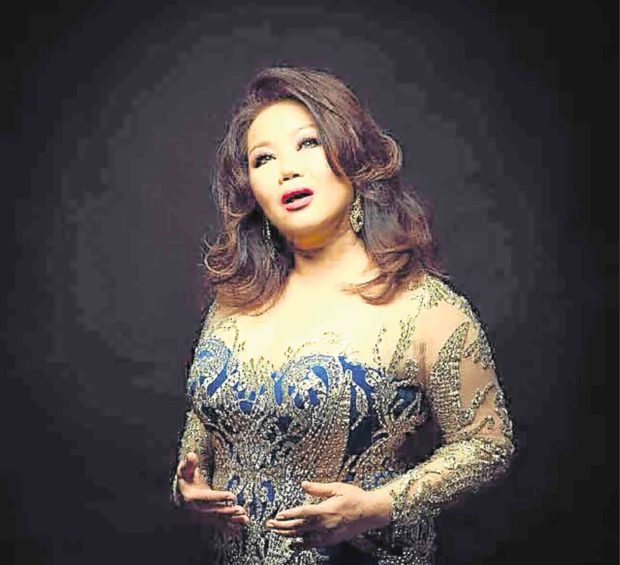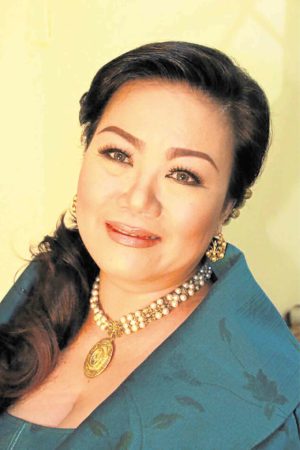For Dulce, it’s time to pay it forward

“That was how hard life was. I could only eat if I found something to put in my mouth—it was either that or I’d go to bed hungry,” the singer recalled.
You don’t need more than 10 minutes of chitchat time with Dulce to realize that the rags-to-riches tale behind her inspiring rise to fame is one for the books.
When we met the seasoned songstress behind such enduring jukebox staples “Ako ang Nagwagi, Ako ang Nasawi” and “Paano” to talk about “United for a Change” (call 891-1111), the benefit concert she topbills with Andrew E, Michael Pangilinan, Jireh Lim and Robin Padilla on June 23 at Resorts World Manila’s Newport Performing Arts Theater, we told her how “ripe” her story was for the big screen or the legitimate stage.
“Why don’t you write it?” she winkingly told us, half in jest.
The acclaimed singer, whose booming emotive voice has been likened by “Les Miserables” and “Miss Saigon” composer Claude-Michel Schonberg to a Boeing 747 taking off, didn’t have fame handed to her on a silver platter—in fact, she stubbornly “chased” her dream after she was snootily told she wasn’t good-looking enough for stardom.
“My neighbor told me bluntly, ‘Nanginginig ang boses mo, at ang laki-laki (it shakes too much, and it’s too loud),’” Dulce said with bittersweet fondness. “My voice wasn’t deemed good enough even for the church choir, kaya nilagay nila ako sa pinakadulong pew kasi hindi maka-blend ang boses ko. But I didn’t mind, as long as they would allow me to sing. I remember being told, ‘Wala kasing vitamins ang kinakain mo, kasi puro dikya (laughs).
“What she said may be wrong, but it wasn’t necessarily untrue. My family was very poor, so I did eat a lot of jellyfish … that was our ulam. You don’t usually eat dikya, but beggars can’t be choosers, so what I did, inaalis ko ang abo at kati, and added vinegar and pepper before eating it.
“That was how hard life was. I could only eat if I found something to put in my mouth—it was either that or I’d go to bed hungry.
“Sometimes, I’d wait for extra pieces of kamote or corn during harvest season. Other times, I’d go to the river, hoping I could find a piece of shrimp hiding under a shell, put it on a hot rock under the scorching sun till it’s ready for eating. When it turns red, it’s dinnertime (laughs)!”
Growing up penniless was the drive that allowed the irrepressible diva to follow her heart and beat the odds.
Dulce’s “stubbornness” eventually paid off when she was hired to perform regularly in a weekly TV show in Cebu—at 9 years old!
“I came out in that show every Saturday and was paid P1 per appearance,” she recalled. “It was good enough for me. Pero para makatipid, hindi talaga ako umuupo sa jeep para 10 centavos lang ang babayaran kong pamasahe, one-way. The driver would tell me to sit down, but I refused. I’d say, ‘Baka pabayarin mo ako, eh.’ So, OK na ako na nakakapit sa likod (laughs).”
Dulce continued to fight for her “art,” even after she began her singing career in Manila.
After hurdling insults from naysayers, who were used to seeing mestiza performers with aquiline noses and pinup-worthy good looks singing about unrequited love and forbidden romances, she found herself fighting a different kind of battle.
“There was a time they ‘smuggled’ me to a clinic in Makati to have my nose done, and they didn’t tell me about it until the doctor started measuring my nose in his clinic,” she said. “When I realized what was going on, tumakbo talaga ako!
“My career was frozen because they said I was hard-headed, so nag-apply ako sa clubs and restaurants just to get by, because I was living alone in Manila. I told my bosses that a rhinoplasty was unnecessary because I knew I had something to offer.”
The singer has a good reason why she doesn’t mind telling this story: “I want to inspire people who rely on talent to see them through difficult challenges. But I don’t regret having stood my ground then because, look, I’m still around making a living out of my God-given talent. Kung kinaya ko, kakayanin rin nila!”
Dulce knows how “lonely” it gets when you feel you’re fighting a battle without anybody backing you up, so she sees the “United for a Change” concert as an opportunity to help the young people of Marawi, who are the concert’s beneficiaries, get the education they deserve.
“I appreciate the blessings that continue to come my way, so it’s just right to pay it forward,” she said.
